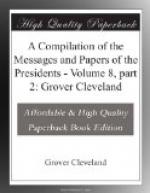And finally, I recommend that on the said day the duties of humiliation and prayer be accompanied by fervent thanksgiving to the Bestower of Every Good Gift, not only for His having hitherto protected and preserved the people of these United States in the independent enjoyment of their religious and civil freedom, but also for having prospered them in a wonderful progress of population, and for conferring on them many and great favors conducive to the happiness and prosperity of a nation.
[SEAL.]
Given under my hand and the seal of the United States of America, at Philadelphia, this 23d day of March, A.D. 1798, and of the Independence of the said States the twenty-second.
JOHN ADAMS.
By the President:
TIMOTHY PICKERING,
Secretary of State.
[From C.R. Adams’s Works of John Adams, Vol. IX, p. 170.]
PROCLAMATION.
JULY 13, 1798.
The citizen Joseph Philippe Letombe having heretofore produced to the President of the United States his commission as consul-general of the French Republic within the United States of America, and another commission as consul of the French Republic at Philadelphia; and, in like manner, the citizen Rosier having produced his commission as vice-consul of the French Republic at New York; and the citizen Arcambal having produced his commission as vice-consul of the French Republic at Newport; and citizen Theodore Charles Mozard having produced his commission as consul of the French Republic within the States of New Hampshire, Massachusetts, and Rhode Island; and the President of the United States having thereupon granted an exequatur to each of the French citizens above named, recognizing them in their respective consular offices above mentioned, and declaring them respectively free to exercise and enjoy such functions, powers, and privileges as are allowed to a consul-general, consuls, and vice-consuls of the French Republic by their treaties, conventions, and laws in that case made and provided; and the Congress of the United States, by their act passed the 7th day of July, 1798, having declared “that the United States are of right freed and exonerated from the stipulations of the treaties and of the consular convention heretofore concluded between the United States and France, and that the same shall not henceforth be regarded as legally obligatory on the Government or citizens of the United States,” and by a former act, passed the 13th day of May, 1798, the Congress of the United States having “suspended the commercial intercourse between the United States and France and the dependencies thereof,” which commercial intercourse was the direct and chief object of the consular establishment; and




